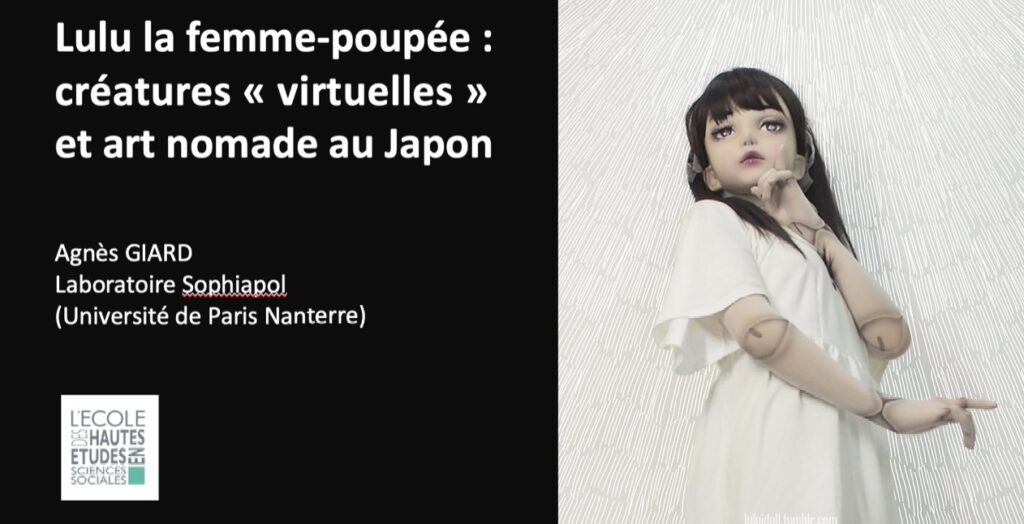L’Institut français de recherche sur le Japon à la Maison franco-japonaise a le plaisir de vous inviter à la conférence en ligne, avec traduction simultanée, intitulée :
« Après la smart city, quelle révolution numérique ?
Enjeux de la digitalisation et
de la mise en données des sociétés urbaines »
Jeudi 24 novembre 2022, de 18h à 20h, heure japonaise
En ligne, avec traduction simultanée
En 2008 était formalisé par IBM le modèle de smart city, ou ville « intelligente », correspondant à la diffusion du numérique dans les infrastructures urbaines afin d’en optimiser le fonctionnement. Près de 15 ans plus tard, une nouvelle génération de technologies numériques, telles que la reconnaissance faciale, l’intelligence artificielle, les voitures et les drones autonomes, ou encore le déploiement de la robotique dans les espaces publics, appelle à de nouvelles réflexions sur la production et l’utilisation des données personnelles, la surveillance des individus, la gouvernance des espaces urbains, ou le rapport entre espaces publics et corps. Quels sont les enjeux sociaux et politiques de cette nouvelle révolution numérique des espaces urbains ? Quels sont leurs impacts sur les modes d’habiter et, plus largement, sur les régimes politiques contemporains ?
Ola SÖDERSTRÖM
Professeur de géographie humaine à l’université de Neuchâtel. Ses recherches récentes portent sur les géographies urbaines de la santé mentale et les technologies et les données comme forme de pouvoir dans le développement urbain. Sur ce second thème, il prépare actuellement l’ouvrage Data Power in Action. Urban Data Politics in Times of Crisis (Bristol University Press, co-édité avec Ayona Datta).
KUDO Hiroko
Professeure en politiques publiques et en gestion à la Faculté de droit de l’université Chūō. Ses principaux sujets de recherche comprennent la théorie de la gouvernance, la gouvernance multi-niveaux, la gouvernance numérique, ainsi que les politiques de Technologies de l’Information et de la Communication et de l’innovation. Elle a publié de nombreux articles, dont How are Citizens Involved in Smart Cities?: Analyzing citizen participation in Japanese « Smart Communities » (avec Benoit Granier).
HOSONO Sukehiro
Professeur émérite à la faculté de politiques publiques de l’université Chūō, dont il a été doyen. Ancien président de la Japan Association of Planning and Public Management, il siège dans divers comités consultatifs et experts du ministère japonais des Finances. Auteur de nombreux ouvrages, il a publié notamment publié Smart communities : de la régénération urbaine à la régénération japonaise (スマートコミュニティ: 都市の再生から日本の再生へ) en 2000 et plus récemment Équations pour réussir l’espace central de la ville – nouvelle perspective publique de « l’aménagement de la ville » (中心市街地の成功方程式―新しい公共の視点で考える“まちづくり”).
KUBO Tomoko
Maîtresse de conférences à la faculté des sciences de l’environnement et de la vie de l’Université de Tsukuba. Géographe spécialiste de l’urbain, elle a publié de nombreux ouvrages, dont The Rise in Vacant Housing in Post-growth Japan (avec Yui Yoshimichi) et Divided Tokyo: Disparities in Living Conditions in the City Center and the Shrinking Suburbs. Son intense activité de recherche lui a valu de recevoir le prix Early Career Award lors du congrès du centenaire de l’Union Internationale des Géographes, en 2022 à Paris.
Modérateur : Raphaël LANGUILLON (IFRJ-MFJ)
Organisation : IFRJ-MFJSoutien : Réseau de recherche international du CNRS « Sustain Asia », Unités Mixtes des Instituts français de recherche à l’étranger d’Asie (CEFC Hong Kong, CSH Delhi, IFP Pondichéry, IRASEC Bangkok)

